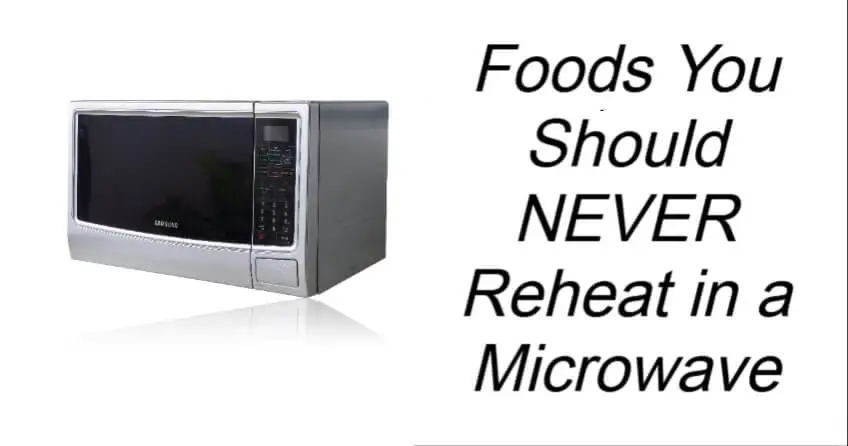Foods You Should Never Reheat in a Microwave
In today’s fast-paced world, the microwave has become a go-to appliance for quick and convenient meal prep. But not everything belongs in the microwave—some foods can become dangerous to your health when reheated due to chemical changes, bacterial growth, or nutrient loss.
To help you avoid potential food safety hazards, here are 11 foods you should never reheat in the microwave—plus safer alternatives!
Microwaves heat food by emitting electromagnetic waves that make water molecules vibrate, generating heat. While this process is fast, it often heats food unevenly, leaving cold spots where bacteria can survive. Additionally, high heat can alter the chemical structure of certain foods, leading to potential health risks.
With that in mind, here are the top foods to avoid microwaving and the best ways to reheat them safely.
1. Chicken – Uneven Heating and Bacteria Growth
Chicken is high in protein, but when microwaved, these proteins break down differently, leading to a rubbery texture and digestive issues. Even worse, microwaves often heat food unevenly, leaving some areas in the danger zone (40°F – 140°F), where Salmonella and Campylobacter bacteria thrive.
Safer alternative: Reheat chicken on the stovetop or in the oven at 350°F until evenly warmed.
2. Rice – A Breeding Ground for Bacteria
Cooked rice is prone to contamination by Bacillus cereus, a bacteria that can produce heat-resistant toxins. If rice is left at room temperature for too long, reheating it won’t kill these toxins, increasing the risk of food poisoning.
Safer alternative: Store leftover rice in the fridge within an hour and reheat it on the stovetop with a bit of water until steaming hot.
3. Potatoes – Risk of Botulism
Cooked potatoes, especially if wrapped in foil and left at room temperature, can harbor Clostridium botulinum, a bacteria that produces a deadly toxin. Microwaving doesn’t always destroy these toxins and may even encourage their growth.
Safer alternative: Store potatoes in the fridge and reheat them in the oven at 350°F.
4. Mushrooms – Nutrient Loss and Digestive Issues
Mushrooms contain proteins and compounds that break down quickly. Reheating them in the microwave can cause digestive discomfort and reduce their nutritional value.
Safer alternative: Reheat mushrooms on the stovetop over low heat to preserve their texture and nutrients.
5. Eggs – A Risky Explosion Hazard
Microwaving eggs (especially hard-boiled ones) can trap steam inside, causing them to explode during or after heating. Plus, reheating eggs changes their texture, making them rubbery and unappetizing.
Safer alternative: If necessary, warm eggs gently on the stovetop.
6. Breast Milk – Nutrient Loss and Hot Spots
Microwaving breast milk destroys essential nutrients and antibodies that are crucial for a baby’s immune system. It also heats unevenly, creating hot spots that could burn a baby’s mouth.
Safer alternative: Warm breast milk by placing the bottle in a bowl of warm water.
7. Seafood – Bad Odors and Bacterial Risks
Microwaving seafood can make it chewy, rubbery, and overly dry. It also intensifies fishy odors and can leave some areas underheated, increasing the risk of foodborne illnesses.
Safer alternative: Reheat seafood gently on the stovetop or in the oven at 275°F.
8. Processed Meats – Harmful Chemical Reactions
Processed meats (like bacon, hot dogs, and sausages) often contain nitrates and nitrites. When microwaved, these compounds can convert into nitrosamines, which are linked to cancer.
Safer alternative: Use a skillet or oven to reheat processed meats.
9. Leafy Greens – Nitrate Conversion Risks
Leafy greens (such as spinach, kale, and celery) contain natural nitrates. When reheated in the microwave, nitrates can convert into nitrosamines, which are potentially carcinogenic.
Safer alternative: Eat leafy greens fresh or reheat them gently on the stovetop.
10. Oils – Toxic Smoke and Free Radicals
Oils like olive oil, flaxseed oil, and grapeseed oil shouldn’t be microwaved because they quickly reach their smoke points, releasing toxic fumes and free radicals that are harmful to your health.
Safer alternative: Warm oils slowly on the stovetop at low heat.
You’ve just read, Foods You Should Never Reheat in a Microwave. Why not read Manager Had To Hire A New Employee.

